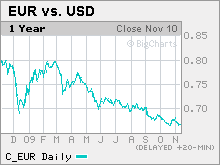Dollar pushes higher
The greenback rises as investors shy away from more risky assets.
NEW YORK (CNNMoney.com) -- The dollar rose Thursday as ongoing concerns about the global economy boosted demand for the U.S. currency as a safe haven.
"It feels very much like the risk trade has hit a brick wall at this point," said Boris Schlossberg, director of currency research at Global ForEx in New York. "The market is in need of fresh data to convince it that a recovery is in place."
The euro was down 0.9% versus the dollar to $1.4855 after climbing near $1.50 overnight. The U.K. pound fell 0.1% to $1.6557.
The dollar index, which gauges the greenback's value against a basket of currencies, was up 0.6% to 75.6. Despite the advance, however, the index remains near a 15-month low and analysts expect the dollar to continue to depreciate.
"It's not like there's a massive change of trend," Schlossberg said. "The path of least resistance in the dollar still seems to be lower."
Stocks slumped in afternoon trading as investors looked past an upbeat jobs report and strong financial results from Wal-Mart.
The currency market was also focused on reports that Taiwan, South Korea and Russia were buying dollars to help arrest the U.S. currency's slide, which has weighed on export-driven economies around the world.
"In countries where exporting is the very core of their growth model, they won't continue to outperform with their currencies strengthening," said Gareth Sylvester, senior currency strategist at HiFx.
While the weak dollar has been a boon for U.S. exporters, many of the nation's trading partners have seen their currencies appreciate significantly, which undermines profits from goods sold in the United States.
Earlier Thursday, members of the Asia-Pacific Economic Cooperation issued a statement calling for, among other things, "market-oriented exchange rates" for global currencies.
The statement echoed comments made by Treasury Secretary Tim Geithner, who wrote in the Asia edition of the Wall Street Journal that "market-oriented exchange rates in line with economic fundamentals" will be essential in rebalancing global economies and developing "new patterns of demand."
Analysts said the talk of market-oriented exchange rates was largely directed at China, which has maintained a weak currency to help support its export driven economy.
"There's been a lot of pressure on the Chinese to allow their currency to appreciate," said Sacha Tihanyi, a currency strategist at Scotia Capital in Toronto. "If Chinese allow currency to appreciate, that will take some pressure off the dollar." ![]()



